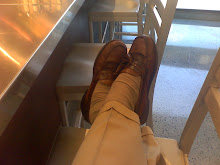Catholic church has no national voice in America anymore
Tom Roberts NCR editor
Bishop Donald Wuerl of Pittsburgh has issued a plea to his brother bishops to "establish a process, mechanism or procedure" for coming to consensus over such issues as when it is appropriate to deny communion to a politician because of his or her stand on abortion.
Fellow Kansas Citian Tom Roberts at the National Catholic Reporter mansion (the one standing upwind from the SSPX priory in midtown Kansas City) discusses in today's "Writer's Desk" post the statement from Pittsburg's Bp. Wuerl first floated a week or two ago (here characterized as a "plea," like Rodney King's "Can't we all just get along?") calling for a national muzzle on "extremist" bishops like Sheridan and Burke who who actually exercise their teaching and governing office. Barnardin's old guard is losing its grip. It still obviously controls the bureaucratic apparatus of the USCCB, but it can't keep all of the new boys in the club from breaking ranks and thinking and governing for themselves anymore, can it? It's not surprising that the old guard can only wring its hands about merely censuring each other for causing the clergy scandals, but it can propose new, ahistorical and beaurucratic structures for a "national voice" when their members are making them look bad to their powerful friends instead of just "pew Catholics."
And who would that national voice be? Certainly not a Burke nor a Chaput, a Sheridan nor a Weigand, a Doran nor a Bruskewitz nor a Vasa nor an Olmstead! They would nonly be allowed to exercise an important aspect of their ecclesiastical governance--discplining certain of their own faithful-- with unanimous approval by all the bishops of the United States (or only with 2/3 of the bishops and Vatican approval). Instead we'd have, as a national voice, none other than USCCB President and Spokane's Bishop Skylstad, the man who just lost a huge gamble that will cost the Catholic faithful of Western Washington everything they've built over the last century or more. NCR is full of un-funny stuff, their drivel with respect to this proposal is so ironic that amusement overtakes anger. Tom Roberts' article does have a really good funny in this one:
What Wuerl pleads for on another level is leadership. One of the hallmarks of bishops appointed during the 25-year reign of John Paul II was loyalty. He wanted no questions about ordination -- no questions about women or married men. He wanted functioning administrators. He wanted no questions about sexual issues. What he got over two decades was a cadre of bishops who understood the terms of their appointments -- no questions, keep the ship steady, unshakable loyalty. That is hardly the kind of profile one would write if the expectation were developing dynamic and creative leadership in an institution.
So what is the problem? Leadership is exactly what these pesky "unpastoral" and "extremist" bishops are showing. Isn't it really loyalty that Wuerl wants? Loyalty to the USCCB club? Avoidance of embarassing questions for other bishops? Let's rewrite the paragraph for Tom:
What Wuerl pleads for on another level is followership. One of the hallmarks of [some] bishops appointed during the 25-year reign of John Paul II was independence. The USCCB apparatus wanted no questions about doctrine or discipline from new bishops -- no unilateral and unambiguous statements about the duties of Catholics in private or public life. John Paul II wanted functioning teachers, administrators, and pastors. He didn't care about getting more team players to support the conference leaders. What he got over two decades was [to some extent] a cadre of bishops who understood the terms of their appointments -- teach, govern, sanctify. That is hardly the kind of profile one would write if the expectation were developing submissive and pastoral followership in an institution.
Ultimately, and unsurprisingly, our NCReporter editor avoids the real story here. Wuerl and his ilk are making a pathetic effort to keep their hands on the helm of American Catholicism, and that pathetic effort is doomed to fail. The real story is that the Bernadin club is disbanding. And I for one couldn't be happier.

